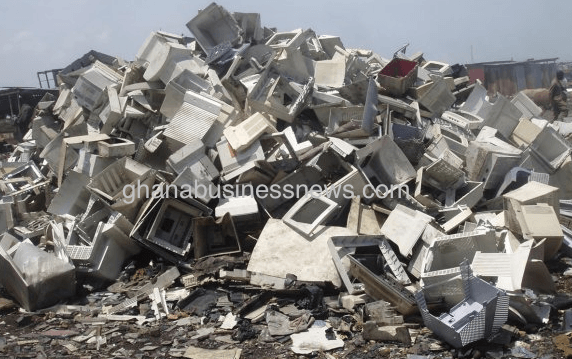HESAG educates Electronic and Electrical Equipment artisans on sustainable e-waste management

The absence of e-waste recycling centres in the country as well as systems for the collection, transportation, treatment, storage, recovery and disposal of obsolete electronic devices is hampering sustainable and environmentally sound e-waste management.
Mr Alhasan Kassim, Deputy Central Regional Chairman of the Ghana Electronic Service Technicians Association (GESTA), made an appeal to government to put in place institutional infrastructures for the collection and recycling of E-waste in the country.
This came to light when Health and Safety Ghana (HESAG), an NGO embarked on an outreach programme to educate members of GESTA in the Central Region on the need for sustainable e-waste management practices.
The artisans were made up of mobile phone, television and radio set repairers as well as scrap dealers.
“Now that we are talking about improved e-waste management, government must establish e-waste recycling centres for the efforts of your organization to become effective”, Mr Kassim said.
“Our small shops cannot contain the wastes we generate, there should be somewhere we can send them. If that is not done, we will have no option than to continue our old ways of disposing “, he said.
He called on members not to haphazardly dispose their e-waste whiles they wait for government to establish the centres.
Mr Martin Essuman, a mobile phone repairer, called on government to show more commitment to ensure improved e-waste management, saying “we are very grateful to you for this education but we pray it is not one of those usual talks. We want the government to show us that they are serious about this”.
Addressing the artisans, Mr Afedzi Abdullah, Deputy Director of Communications of HESAG, said e-waste remains unregulated with actors in the informal sector mostly, key players not having the requisite training and education.
He said though the electronic industry is one of the world’s largest and fastest growing manufacturing industry, sustainable management of obsolete electronic devices was the biggest challenge.
He said, the industry has become a leveraging point for socio-economic and technological growth of developing societies in the past few decades but the magnitude of its consumer oriented growth combined with rapid product undesirability and technological advances were new environmental challenges.
“E-Waste is an emerging global problem but it does also provide a business opportunity of increasing significance, given the volumes of e-waste being generated and the content of both toxic and valuable materials in them”, he said.
Mr Abdullah expressed concern on the existing solid waste management challenges in the country which was becoming more complicated by the invasion of e-waste, largely because E-waste from developed countries found an easy way into country.
He said the nation is estimated to import about 215,000 tons of electronic and electrical equipment annually out of which 170,000 tons were second-hand goods with about 22,000 tons being complete waste.
Abdullah said the fact that large parts of e-waste constituted iron, steel and precious metals such as gold, copper, palladium, silver, platinum and cobalt; means they provided economic incentive for recycling.
Source: GNA
